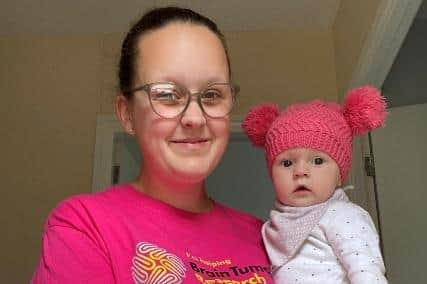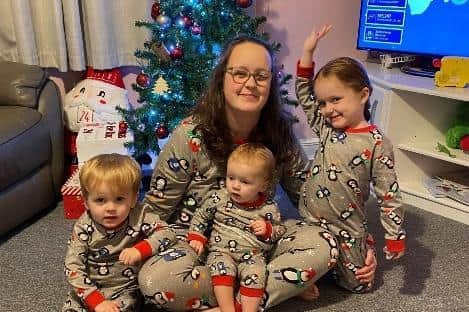Northamptonshire woman diagnosed with inoperable brain tumour during pregnancy preparing to fundraise for third time
and live on Freeview channel 276
A young woman from Northamptonshire, who was pregnant when diagnosed with an inoperable brain tumour, is preparing to take part in her third fundraiser for Brain Tumour Research.
Mother-of-three, Sophie O’Ware, was 34 weeks pregnant when she started suffering from severe headaches and was diagnosed with a brain tumour in October 2020.
Advertisement
Hide AdAdvertisement
Hide AdThe 23-year-old, from Bugbrooke, gave birth to her daughter, Autumn-Rose, by caesarean a few weeks later.


A subsequent contrast MRI scan identified the tumour as a low grade glioma in January 2021.
Due to its location on the brainstem, she was told it could not be operated on and a biopsy would not be possible. Instead, she was placed on a ‘watch and wait programme’, which relies on regular MRI scans to monitor for changes.
Sophie said: “It was tough, especially because, due to Covid-19, I was all on my own when they told me they’d found the lesion and obviously my family was panicking.
Advertisement
Hide AdAdvertisement
Hide Ad“They couldn’t really tell me much whilst I was pregnant as I couldn’t have the contrast MRI so we were left in the dark until after I’d given birth and, naturally, we thought the worst; it was horrible.”


Sophie – who has two more children, Theodore, two, and Olivia-Grace, four – is now preparing to take part in the Brain Tumour Research charity’s 10,000 Steps a Day in February Challenge, having previously taken part in its 'Walk of Hope' and 'Wear a Hat Day' events.
Her biggest challenge will be keeping her step count up on the days she suffers debilitating headaches, which often trigger around three seizures a month.
Sophie continued: “It makes me want to do things to see past my diagnosis. It’s harder because I can’t rest as I should but it keeps me motivated because I have to carry on and be a mum.
Advertisement
Hide AdAdvertisement
Hide Ad“Hopefully, one of these days, we’ll be able to get to the bottom of this disease. I’m hoping the research will mean that one day they’ll be able to operate on the brainstem so that people like me don’t have to live with the consequences of having a brain tumour.
“I’m also keen to raise awareness so that more people know about this cause and come forward to support it.”
The Brain Tumour Research charity is hosting the February challenge for the second year in a row, following last year's success which raised almost £1 million to support research and campaigning.
The charity is now calling for people to step up to the 10,000 Steps a Day in February challenge and make it 'even bigger and better in 2022. Participants will receive a free emoji t-shirt and fundraising pack when they receive their first donation and a special medal if they raise £274 or more.
Advertisement
Hide AdAdvertisement
Hide AdCommunity development manager for Brain Tumour Research, Charlie Allsebrook, said: “Sophie’s story is a stark reminder of just how indiscriminate brain tumours are, affecting anyone at any age and time.
"They kill more children and adults under the age of 40 than any other cancer yet historically just one per cent of the national spend on cancer research has been allocated to this devastating disease.
"We’re grateful for Sophie’s support in helping us to fund vital research to improve treatment options for patients and, ultimately, find a cure.”
Brain Tumour Research funds sustainable research at dedicated centres in the UK. It also campaigns for the government and the larger cancer charities to invest more in research into brain tumours in order to speed up new treatments for patients and find a cure.
Advertisement
Hide AdAdvertisement
Hide AdThe charity is the driving force behind the call for a national annual spend of £35 million in order to improve survival rates and patient outcomes in line with other cancers such as breast cancer and leukaemia and is also campaigning for greater repurposing of drugs.
To support Sophie’s fundraising, visit www.facebook.com/donate/912989979353138